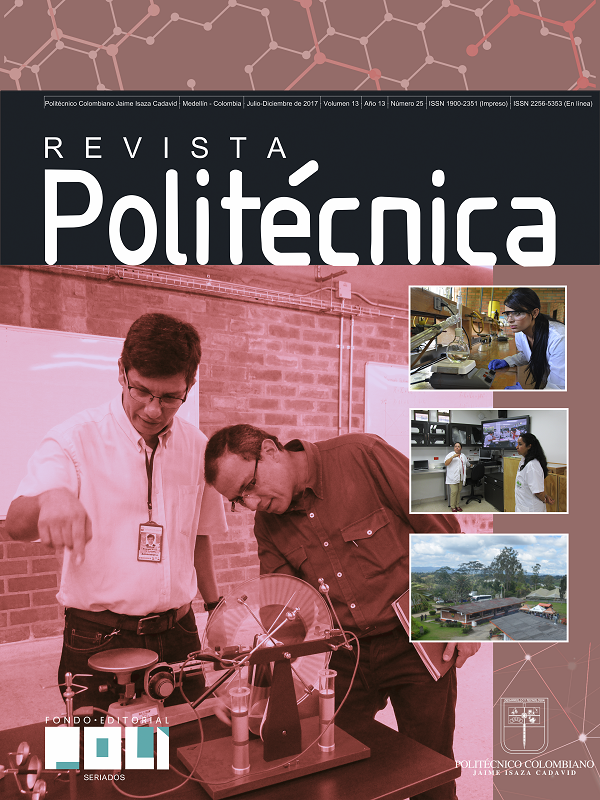Performance Analysis of Turbo and Convolutional Coding Schemes of Downlink LTE-Advanced
DOI:
https://doi.org/10.33571/rpolitec.v13n25a2Palavras-chave:
4G Mobile Communication, Bit Error Rate, Convolutional codes, LTE, MIMO, Performance, Quadrature Amplitude Modulation, Turbo codesResumo
This article presents a comparative performance analysis of the turbo and convolutional encoders applicable to LTE-A Downlink, access technology that is booming in the region. For this, simulation models were developed at the link level in Simulink® based on recommendations from the ETSI, that allowed characterizing the response of the coders in terms of bit error rate and throughput finding the particular situations where it is preferable to use convolutional encoding on the In order to optimize the use of computational and energy resources of the devices in the mobile network.
Métricas do artigo
Resumo: 810 HTML (English): 176 PDF (English): 800 XML (English): 63Métricas PlumX
Referências
I. F. Akyildiz, D. M. Gutierrez-Estevez, and E. C. Reyes, “The evolution to 4G cellular systems: LTE-Advanced,” Phys. Commun., vol. 3, no. 4, pp. 217–244, 2010.
O. G. Jorge, “Estudio de Técnicas de Codificación de Canal en Redes Celulares OFDM,” Cuadreno Red cátedras Telefónica, pp. 4–11, 2012.
ETSI, “TS 136- 212 LTE, Evolved Universal Terrestrial Radio Access (E-UTRA), Multiplexing and channel coding,” 2015.
MathWorks (R), “Convolutional Encoder System object,” 2015. [Online]. Available: https://www.mathworks.com/help/comm/ref/comm.convolutionalencoder-class.html. [Accessed: 10-Jun-2016].
S. Haykin, Communication Systems, 4th ed. México: Wiley India Pvt. Limited, 2006.
A. Thomas, K. Radhakumar, C. Attada, and B. S. Rajan, “Single Uniprior Index Coding With Min – Max Probability of Error Over Fading Channels,” vol. 66, no. 7, pp. 6050–6059, 2017.
G. Durisi, E. G. Str, J. Ostman, J. Li, H. Sahlin, and G. Liva, “Low-latency Ultra-Reliable 5G Communications : Finite-Blocklength Bounds and Coding Schemes,” pp. 1–6, 2017.
C. Anghel, C. Paleologu, and C. Stanciu, “Performances evaluation of CTC turbo decoder for LTE systems,” in 2015 57th International Symposium ELMAR (ELMAR), 2015, pp. 89–92.
P. Gao, “Analysis and realization on turbo equalization based on 64-QAM in OFDM system,” Res. J. Appl. Sci. Eng. Technol., vol. 6, no. 4, pp. 720–728, 2013.
D. Robert, W. W. Library, and L. Riche, “The performance of high-order quadrature amplitude modulation schemes for broadband wireless communication systems,” 2012.
L. K. H. G, K. N. Manjunatha, M. S. Suma, C. K. Raju, P. Cyril, and P. Raj, “Design and Performance analysis of a 3GPP LTE / LTE-Advance turbo decoder using software reference models,” vol. 2, no. 7, pp. 3–6, 2011.
B. Zhang et al., “A 5G Trial of Polar Code,” pp. 7–12, 2016.
E. Migabo and T. Olwal, “A simulation design of LTE communication system under adaptive modulation schemes,” in 2015 International Conference on Emerging Trends in Networks and Computer Communications (ETNCC), 2015, pp. 1–6.
H. Gamage, N. Rajatheva, and M. Latva-aho, “Channel Coding for Enhanced Mobile Broadband Communication in 5G Systems,” pp. 6–11, 2017.
I. Yoo, B. Kim, and I. C. Park, “Reverse Rate Matching for Low-Power LTE-Advanced Turbo Decoders,” IEEE Trans. Circuits Syst. I Regul. Pap., vol. 62, no. 12, pp. 2920–2928, 2015.
GSMA Intelligence, “The Mobile Economy Latin America and the Caribbean 2016,” London, 2017.
MINTIC - Colombia, “Boletín trimestral de las TIC - Cifras primer trimestre 2017,” Bogota, 2017.
O. Ülgen, J. J. Black, B. Johnsonbaugh, and R. Klunge, “Simulation methodology: A practitioner’s perspective,” Dearborn, MI Univ. Michigan, 2006.
S. Schwarz, C. Mehlfuhrer, and M. Rupp, “Low complexity approximate maximum throughput scheduling for LTE,” in 2010 Conference Record of the Forty Fourth Asilomar Conference on Signals, Systems and Computers, 2010, pp. 1563–1569.
S. Gomez Bastar, Metodologia de la investigacion. 2012.
H. Taoka, S. Nagata, K. Takeda, Y. Kakishima, X. She, and K. Kusume, “MIMO and CoMP in LTE-Advanced,” NTT DOCOMO Tech. J., vol. 12, no. 2, pp. 20–28, 2010.
MathWorks (R), “Bernoulli Binary Generator,” 2015. [Online]. Available: https://www.mathworks.com/help/comm/ref/bernoullibinarygenerator.html#fp12158. [Accessed: 10-Jun-2016].
MathWorks (R), “Convolutional Interleaver,” 2015. [Online]. Available: https://www.mathworks.com/help/comm/ref/convolutionalinterleaver.html. [Accessed: 10-Jun-2016].
MathWorks (R), “Adaptive MIMO System with OSTBC,” 2015. [Online]. Available: https://www.mathworks.com/help/comm/examples/adaptive-mimo-system-with-ostbc.html. [Accessed: 10-Jun-2015].
MathWorks (R), “AWGN Channel,” 2015. [Online]. Available: https://www.mathworks.com/help/comm/ref/awgnchannel.html. [Accessed: 10-Jun-2016].
MathWorks (R), “OSTBC Combiner,” 2015. [Online]. Available: https://www.mathworks.com/help/comm/ref/ostbccombiner.html. [Accessed: 10-Jun-2016].


 _
_






















